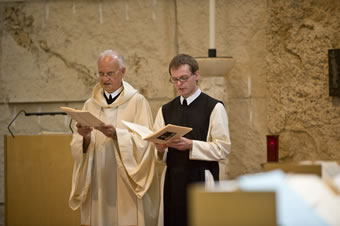The Rule of St. Benedict describes our life as a return to God accomplished through the loving observance of God’s commandments and the fervent performance of “good deeds” (Prologue 22). It is a life lived in Christ, for it is always by his power, and not our own, that “the good” is brought about in us (Prologue 29). This life of return, or conversion, is a life characterized by perseverance; for as we endeavor to “run on the path of God’s commandments, our hearts overflowing with the inexpressible delight of love” (Prologue 49) we inevitably find ourselves in need of constant purification. But it is a blessed struggle, for by “faithfully observing God’s teaching in the monastery until death” we believe that we will patiently share in the sufferings of Christ, hoping “that we may deserve also to share in his kingdom” (Prologue 50).
This life of “return” is in essence the fulfillment of our baptismal call as Christians. This call to obedience, good deeds and conversion to Christ is carried out in the monastery through a life of prayer and work, or ora et labora. In the monastery we order our lives around prayer and the service of God. Since Christ is immediately present for us in the Church, with which He is inseparably united, our service and love for God must lead to a service and love for our neighbor (Cistercian Life Today 44). This is the key to the unity of our vocation as monks, priests and teachers: our offerings of prayer and penance in the monastery, our priestly ministry to the faithful, and our role in the formation of the young should all be animated by a spirit of love and service for Christ and His Church. We are monks, priests and teachers above all for the sake of loving and serving Christ and His Church.

